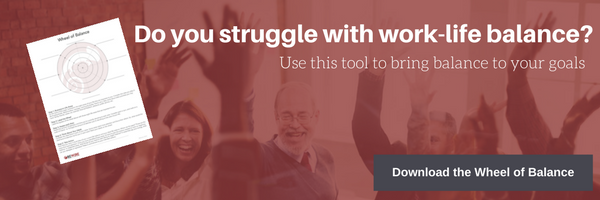Wish we could turn back time -- to the good old days
When our momma sang us to sleep -- but now we're stressed out
~Twenty One Pilots, “Stressed Out”
Readers who’ve met me in real life likely know that, in addition to my work with Rewire, I teach yoga. A few years ago, I had a scheduling conflict and asked my friend Sarah to lead the class in my place. The class was held in a yoga studio below an accounting firm. Unfortunately, poor Sarah turned the bass on her music a bit too high. So a few minutes into class, the meditative stillness was broken by a BANG! BANG! BANG! BANG! on the door. The whole class started and turned to see a red-faced, stress-deranged accountant yelling “TURN DOWN YOUR MUSIC!”
That man’s stress had caused him to snap.
Every job has those moments — a looming deadline, a big order to fill, an important case, an overloaded census. How do you make it through those squeeze times without losing your sanity, and without negative impact on your health and relationships?
Rewire's seven recommendations for successfully navigating stress:
- Remember that this period of maximum stress is temporary. It cannot be and should not be sustained indefinitely. You can put up with a lot if you know it’s for a fixed period of time. Meditation practice is helpful here as it reminds us of the transitory nature of things: sounds come and go, moods and emotions are constantly in flux, thoughts arise and then disappear and so on.
- Make sleep a top priority. You won’t get all the sleep that you need, but you should get as much sleep as you can. Rewire’s #1 rule for getting good sleep is “no screen time in bed!” Use weekends to catch up on sleep by going to bed earlier and trying to wake up at the same time you do during the work week. This helps keep your circadian rhythms calibrated, which also contributes to sleep quality.
- Eat as healthfully as possible. You are what you eat and eating junk food will just make you feel… well, terrible. Nutritionists recommend avoiding simple sugars and excessive caffeine. Fruits and vegetables are always good choices.
- Skip alcohol as a means of relaxing. This is not forever, just during this particular crunch time. Although alcohol in small doses can be helpful managing stress, it also interferes with sleep and taxes your liver. In the short-term, give it up. If avoiding alcohol is a no-go for you, then make sure you at least don’t increase your intake during the crunch.
- Do not take on other stressful projects during crunch time. This is not the time to start a new, radical calorie-restricting diet, remodel your kitchen, or volunteer to host out-of-towners unless they are there exclusively to be helpful.
- Get daily physical activity. Go for a 15-minute walk around the building when your energy starts to lag in the afternoon. Stand up, stretch, move around once every hour that you are sitting down. Exercise increases endorphins (the happy neurochemicals).
- Take care of your spouse/partner. Crunch time for you becomes crunch time for them. Here are some ways to support them.
- Remind them that this situation is temporary.
- Give them as much detail as possible in advance about your new work hours/routine on a daily, weekly, and monthly basis. Uncertainty, alone, is stressful. Over communicate. Revisit old information again and make sure any new information is shared right away.
- Give them permission to cut corners on the home front (and while we’re at it, give yourself permission, too). Let the house be a little messier, and let your obligations be a little looser.
- Get help for both of you. Hire a teenager to help with childcare or to walk the dog. Indulge and find someone to help clean up or do the cooking.
- Be true to your word. If you say you’ll be home by 7pm, be home by 7pm. If something comes up (a meeting, bad traffic, an emergency) and you cannot be home by then, let your partner know as soon as you know.
- Express appreciation. Let your significant other know how grateful you are for their support and that you recognize the impact of your work crunch on their life.
- Sex. There, I said it. Sex is sometimes a casualty of stress, but it’s still important in the midst of stressful times. It’s obviously both a good physical activity and an emotional release. And like exercise, it also increases the presence of endorphins in the body and keeps us feeling connected to the people we love and care about most in this world.
Remember, almost every job comes with crunch times certain to test our resolve to be healthy, sane and kind. You won’t get far with platitudes such as, “Hang in there,” but caring for your basic needs of sleep and nutrition will help you stay the course with your dignity and your relationships intact.
Do you have any other stress-management tools that’ve saved you? We've got a work-life balance guide that we're pretty proud of. I’d love to hear about them in the comments section.




